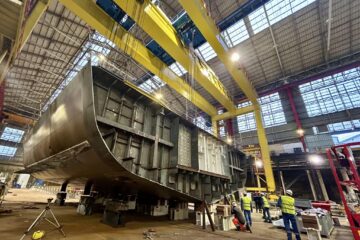SEAOWL press release
This demonstration is a key step in the “ROSS” project (Remotely Operated Service at Sea) led by SEAOWL, a company specializing in marine services. Financed by Ademe (French ecology transition agency), Total and Naval Group, this project should lead within two years to the construction of clean, 100% remotely operated electric ships, which will be used for the maintenance of offshore platforms. They will be among the first “zero-emission” vessels with electric propulsion approved by the French flag.
This pioneer test led to the delivery of the navigation permit to the shipowner. This event was also the opportunity to give rich feedback on security and cyber security issues related to this new technology.
The Minister “welcomes this wonderful project, which shows how the French maritime sector can be at the cutting edge of technology“. She also welcomes “the awarding of this navigation permit, which is a concrete example of the successful cooperation between the company and the administration, and highlights the ability to innovate without concession with regard to the safety of our shipowners. »

The project was born in 2015 from discussions between SEAOWL and its clients in the energy sector who wanted to “improve logistics performance” for “monitoring and inspection missions of the seabed” on wind or oil fields, relates the company’s President Xavier Genin.
Captain Ludovic Gin, installed under a giant immersive bubble and surrounded by eight screens, joysticks and radar, confesses to having surpassed his apprehensions. “We work exactly the same way as on board. I don’t really feel any latency,” he says. And indeed, with eight cameras and three satellite antennas riveted to the ship, there’s no dead point, guarantees one of the members of the crew.

The project is also being developed in partnership with Marlink and Bureau Veritas, to ensure the reliability of the link and strengthen cybersecurity.
With this technological breakthrough, SEAOWL presents itself as a major industrial player in maritime digital technology. The unmanned vessel, piloted on land, will reduce operating costs by 20 to 30%, reduce risks for the crew, but also increase operational capacity.






